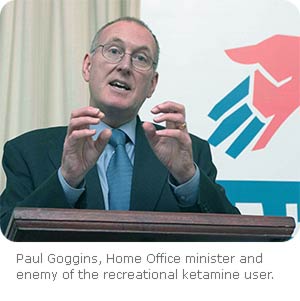#2 Dangerous drug?
Myth #2 Ketamine is a dangerous drug
In a society that adopts the crass blanket generalisation that all drugs are bad and dangerous it follows automatically that ketamine must be bad and dangerous too. When hailing in the new ketamine ban Home Office minister Paul Goggins claimed "Ketamine presents serious health risks" [4]. Exactly what these are is somewhat less clear.

Goggins claimed that ketamine:
- affects the memory
- might "lead to psychotic relapse or the precipitation of schizophrenia in those who have a tendency towards such disorders"
- could be fatal when mixed with alcohol
- and was "potentially dangerous to people with cardiovascular diseases".
Since this was the speech that lead directly to ketamines criminalisation its worth looking at these one by one. The source for Goggin's claims and the recommendation for legislation was a report by the Advisory Council on the Misuse of Drugs (ACMD) in the spring of 2004 [6].
Memory loss
There is no doubt that ketamine affects one's memory whilst on it as does cannabis and alcohol. The ACMD report says the effects are 'profound'. More relevent but less clear is whether memory is affected afterwards or not. The worst the report can say here is that "there is now some evidence to show that subtle memory deficits persist for longer than 3 days after use" which are "worse for regular users of ketamine". Measuring 'subtle memory deficits' must surely be difficult since other many other factors can also have an effect such as tiredness. The amount of memory loss we're talking about here is so slight that users of ketamine don't even notice its effect. But even if true, minor memory impairment for more than 3 days can hardly be considered a 'serious health risk'.
Psychotic relapse
The next claim is that ketamine causes a relapse of psychotic episodes or schizophrenia in people with a predisposition. The ACMD state there is concern that ketamine might have such an effect but the only study quoted suggests that this is unlikely. Ketamine was given to schizophrenics to see what it did! Leaving aside the ethics of such research a review of these studies, "reported that very few patients developed relapse that required treatment or re-admission to hospital".
Alcohol
"Ketamine could be fatal when mixed with alcohol" is a warning seen on both sides of the drugs debate and it's undoubtedly better to avoid mixing the two. However anyone who's been around the UK dance scene will surely have noticed that mixing the two is extremely common. Trying to find reports of ketamine related deaths is extremely difficult. The empirical evidence doesn't appear to match the science. Why this should be is hard to say. The science is not at fault. Mixing k and with respiratory depressants is universally warned against from both pro and anti drug organisations. It might be that the recreational amount is considerably smaller than the amount used as an anesthetic and so the risk is greatly reduced.
Cardiovascular disease
Goggins next claim is that ketamine could be "dangerous to people with cardiovascular diseases". Well that's no doubt true but then so are a lot of things. Alcohol, tobacco, sugar, stressful work, motor racing, jogging, ignorant politicians and whole bunch of other things all put people with cardiovascular disease at risk.
The ACMD report puts it like this:
The cardiovascular actions of ketamine are similar to the effects of exercise. It produces stimulation of the cardiovascular system that leads to an increase in heart rate, cardiac output and blood pressure. This could potentially be dangerous to people with diseases of the cardiovascular system including those with coronary artery disease, irregularities of heart rhythm, high blood pressure, and in individuals at risk of stroke.
The ACMD report goes on to say that it is this cardiovascular property that makes ketamine safe. You are less likely to choke with ketamine because you can "maintain your own airway" and this, "reduce[s] the potential risks for the recreational user".
Conclusion
So to sum up on these 'serious health risks': if you don't drink at the same time, don't have a tendency towards schizophrenia, and don't suffer from a cardiovascular disease then the only risk is that your memory may be subtley impaired for more than 3 days. Then again it might not. Either way you're unlikely to notice.
Document Links
- [4]
-
Parlimentary debate
http://www.publications.parliament.uk/cgi-bin/newhtml_hl?DB=semsimple&STEMMER=en&WORDS=ketamin&ALL=&ANY=&PHRASE=&CATEGORIES=&SIMPLE=ketamine&SPEAKER=&COLOUR=Red&STYLE=s&ANCHOR=muscat_highlighter_first_match&URL=/pa/cm200506/cmstand/deleg1/st051031/51031s01.htm#muscat_highlighter_first_matc
- [6]
-
ACMD report on ketamine - PDF file
http://www.drugs.gov.uk/publication-search/acmd/ketamine-report.pdf?view=Binary
Content is available under Attribution-ShareAlike — http://creativecommons.org/licenses/by-sa/2.0/